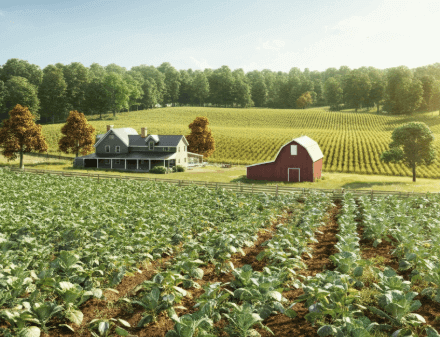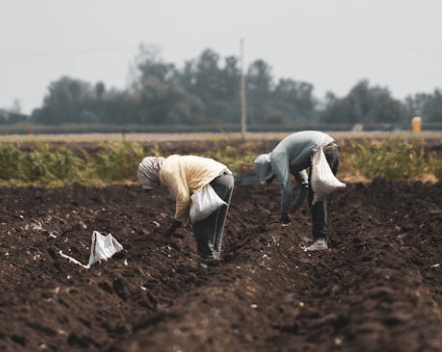If you’ve wondered, “How much can a 100-acre farm make?” the answer largely depends on factors like crop selection, market trends, and land management practices. On average, a well-run farm of this size can generate between $200,000 and $500,000 annually, with citrus fruits, strawberries, and livestock being among the most lucrative options. Visionary real estate investors and cash land buyers Steve Daria and Joleigh emphasize the importance of diversifying income streams, from crops to agritourism, to maximize profits. Florida’s climate enables year-round farming, offering opportunities for higher earnings. Did you know that a strawberry crop alone can bring in $30,000 to $60,000 per acre? By efficiently managing operational costs and selecting high-demand products, the profitability of a 100-acre farm can soar. If you’re serious about farming success and still asking, “How much can a 100-acre farm make?” Now’s the time to gain insights from experts. Book a free discussion with Steve Daria and Joleigh today and get expert advice tailored to your farming goals!
Key Points
- Potential Earnings Range: A well-managed 100-acre farm can generate between $200,000 and $500,000 annually. The specific income varies based on crop type, livestock, and market conditions.
- Impact of Crop Selection: Selecting high-demand crops, such as strawberries, citrus fruits, or tomatoes, can significantly boost profits. For example, an acre of strawberries alone can bring in $30,000 to $60,000 per year.
- Livestock Opportunities: Raising livestock, such as cattle, poultry, or goats, can provide a steady revenue stream. A 100-acre farm can support up to 60 cattle, with potential annual earnings of $60,000 or more from beef sales.
- Added Value Through Agritourism: Hosting activities such as farm tours, hayrides, or seasonal events can generate an additional $20,000 to $50,000 annually. Agritourism not only boosts profits but also increases community engagement.
- Importance of Effective Management: Operational costs, like infrastructure and labor, must be carefully managed to maximize profitability. Investing in efficient practices and technologies can reduce expenses while improving output.
What factors affect the income of a 100-acre farm?
The income of a 100-acre farm is influenced by a variety of factors.
The choice of crops or livestock plays a crucial role, as certain products—like strawberries, citrus fruits, or cattle—are often more profitable than others.
Regional climate and soil quality also affect the overall yield and profitability, influencing what can be grown or raised successfully.

Operational costs, including labor, equipment, seeds, and fertilizers, must be carefully managed to keep expenses in check.
Market trends and demand for specific products will also dictate pricing and profitability.
Diversifying revenue streams, such as incorporating agritourism or direct-to-consumer sales, can significantly boost income potential.
Efficient resource management, such as water usage and pest control, is crucial for enhancing outcomes and minimizing waste.
To better understand “How much can a 100-acre farm make?” it is essential to consider all these factors and plan accordingly.
Get Started: Get Your Cash Offer Below…
We are direct land buyers. There are no commissions or fees and no obligation whatsoever. Start below by sharing where your property is and where we can send your offer…
What is the average income of a 100-acre farm?
The average income of a 100-acre farm can vary significantly based on the type of farming and location.
On average, a well-operated farm of this scale can generate annual revenue ranging from $200,000 to $500,000.
Farms that grow high-value crops, such as strawberries or citrus fruits, often yield higher profits.
For instance, strawberries can bring in $30,000 to $60,000 per acre in revenue, highlighting their profitability.
Livestock farming, such as raising cattle or poultry, can also be lucrative, with cattle farming alone earning up to $72,000 annually with proper management.
Key factors that influence average income include soil quality, climate conditions, and access to local or regional markets for selling produce or livestock.
Diversifying income streams, such as including agritourism or direct-to-consumer sales, can further enhance profitability.
Efficiently managing operational costs, such as labor, equipment, and resources, is crucial to maximizing farm revenue.
When evaluating “How much can a 100-acre farm make?” These variables emphasize the importance of strategic planning and efficient resource allocation for optimal results.
What are the startup costs for a 100-acre farm?
- Land Purchase or Lease: The primary cost is acquiring the land, which can range from $500,000 to $1,000,000, depending on the location, soil quality, and infrastructure. It’s a key factor in determining “How much can a 100-acre farm make?” as farmland with better yield potential leads to higher profits.
- Equipment and Machinery: Essential tools, such as tractors, plows, and irrigation systems, can cost $50,000 to $100,000 or more. Proper equipment ensures efficient farming practices, which directly impacts “How much can a 100-acre farm make?” in the long term.
- Seeds, Fertilizers, and Soil Preparation: Starting crops requires quality seeds and fertilizers, which can cost between $10,000 and $30,000 annually, depending on the chosen crops. Soil preparation, including testing and conditioning, is an upfront expense to ensure strong crop yields.
- Operational Buildings and Infrastructure: Barns, storage units, or greenhouses may need to be built and can cost between $20,000 and $150,000, depending on size and materials. These structures are vital for protecting equipment, harvested crops, or housing livestock.
- Labor and Utilities: Hiring workers and covering utilities, such as water, electricity, and fuel, typically range from $50,000 to $100,000 annually. Efficient utility management and skilled labor are crucial for maintaining farm productivity and profitability.

How can I calculate expected income from a 100-acre farm?
To calculate the expected income from a 100-acre farm, you need to evaluate several key factors.
Start by identifying the type of crops or livestock you plan to manage, as certain options are more profitable than others.
For example, an acre of strawberries can generate $30,000 to $60,000 annually, while citrus fruits and tomatoes are also high-income crops.
Next, research market prices and demand for your chosen products to estimate potential revenue per acre.
Subtract operational expenses, such as labor, equipment costs, seeds, and fertilizers, which can range from $100,000 to $200,000 annually.
Consider diversifying, such as adding agritourism or selling directly to consumers, which can significantly increase overall earnings.
Your yield and profitability will be heavily impacted by external factors, including soil quality and climate conditions.
When examining “How much can a 100-acre farm make?” detailed planning and realistic projections based on these variables will give you a clear idea of income potential.
What licensing or permits do I need to start farming on 100 acres?
- Business Registration: Register your farm as a business to ensure legal operation and meet tax obligations. Creating a legal entity for your farm is a crucial step in effectively managing the financial obligations that accompany farming.
- Zoning and Land Use Permits: Verify the zoning classification of your land to ensure that farming is permitted. You may need special permits if your farm activities include agritourism or the construction of new buildings.
- Water Usage Permits: Many farms require permits for irrigation or water usage, especially if you plan to use wells or other water sources. These permits help regulate water consumption practices.
- Environmental Permits: Depending on your region, you may be required to obtain permits related to environmental impact, such as those for conservation or waste management. These are often required if livestock or fertilizers are involved.
- Livestock Permits: If you plan to raise animals, check regulations on housing, waste handling, and disease prevention. Proper permits contribute to the successful management of livestock and can directly impact “How much can a 100-acre farm make?”
- Pesticide Application License: Using pesticides or chemicals requires certification to ensure their safe and legal application. This protects both your crops and the environment from harmful misuse.
- Sales and Food Safety Permits: If you plan to sell produce or livestock directly to consumers, permits related to food handling and safety are essential. These are especially important for farmers’ markets or direct-to-consumer sales.
Where can I get financial support for starting a farm?
Financial support for starting a farm can come from several sources, making it easier to manage startup costs.
Government programs, such as agricultural grants and low-interest loans, are often available to new or experienced farmers.
Many banks and financial institutions also offer loans specifically designed for agricultural businesses, helping to cover expenses such as land, equipment, and labor.
You can explore nonprofit organizations and farming cooperatives, which sometimes provide grants or training programs.
Crowdfunding platforms are another option, where you can share your farm vision and gather contributions from your community.
Before applying for financial aid, prepare a strong business plan that outlines your goals, expected costs, and potential sources of income.
Detailed planning is especially helpful in answering questions like “How much can a 100-acre farm make?” to showcase profitability to lenders or investors.
To start finding financial support, contact your local agricultural office or research online loan and grant options tailored for farmers.
Take the first step today to turn your farming dream into a reality!
**NOTICE: Please note that the content presented in this post is intended solely for informational and educational purposes. It should not be construed as legal or financial advice or relied upon as a replacement for consultation with a qualified attorney or CPA. For specific guidance on legal or financial matters, readers are encouraged to seek professional assistance from an attorney, CPA, or other appropriate professional regarding the subject matter.
